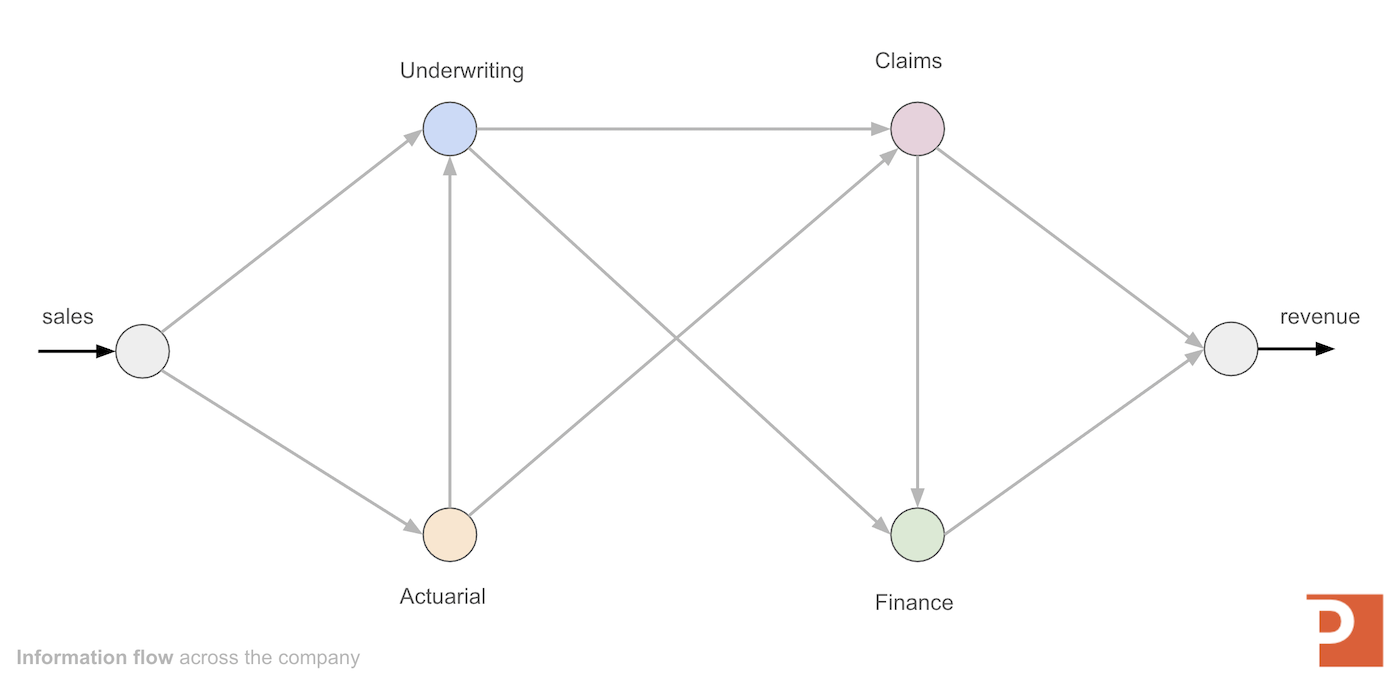How Technology Investment Enables Growth
Labor has shifted from agriculture and manufacturing to services through structural transformation, giving rise to more efficient knowledge work as a competitive advantage. Companies adopted better tooling to process information in knowledge work heavy services sectors in an effort to be more productive and competitive.
Knowledge work is information processing in non-labor-output roles. As information flows into the company's business units, it is processed and enriched through knowledge work until it acts on its intended goal (e.g., "capturing revenue"). In the graph below we can see an example of a property insurance company generating revenue through information flow across its business units arranged as a graph.

Knowledge work technology supports information processing in a company's graph of information flow and serves as a critical catalyst for converting incoming data into actionable insights, ultimately facilitating a faster and more efficient flow of sales into cash. Improving your information processing capabilities directly correlates to improving how well you produce business results.
Similar to how economists evaluate how well an industry is performing through a labor productivity rating, a term I use for how well a company transforms information in knowledge work is "information productivity", defined as:
"The effectiveness and efficiency with which a company turns data into useful insights that drive business results."
When all things are equal in a market segment, we need better technology to process information more efficiently than competitors. We need to continually innovate through knowledge work technology adoption and evolution.
Therefore, we compete through our investment in information processing technologies.
Capital Efficiency Through Technology Investment
To be more productive and efficient as an organization, we have to invest in our technology to create a competitive edge in our market. This gives us:
- better information processing that will translate into better YoY revenue growth
- better revenue growth that will not only help your organization meet their goals but also make it more valuable as a company
If the tools we use to process information drive our information productivity, then our investment in these tools is directly related to how capital efficient we are as an organization. Ultimately, capital efficiency derived from effective data integration and knowledge management helps ensure that your company avoids the common pitfall of inefficient cash flow management during critical growth phases.
By optimizing cash flow and minimizing operational overhead, your company positions itself to grow at the highest rate allowed by market conditions, reinforcing a virtuous cycle of expansion, strong valuation, and sustained competitiveness. This is the relationship between technology investment and information productivity.
Our technology investment drives capital efficiency, creating more cash flow for sales and marketing, increasing valuation, and creates better terms to raise capital. This increase in operational efficiency sets the company up for growth.
The Evolution of Information Transformation Enables Growth
We can sum up the rise of the information economy as:
Technology changed the services sector and knowledge work through the digitization of tabular data and the application of computers to basic information processing tasks. Once data was being processed into information with computers, this allowed better software methods to accelerate information processing.
I've connected information processing across a company to cash flow and capital efficiency. Then this means that how we invest in our technology and evolve our tools and platforms for information processing directly impacts how competitive we are in a market. The future of your organization comes down to:
Companies don't buy software.
Companies buy (information) productivity.
If we accept the framing that "non-labor roles are knowledge work” and “knowledge work is information manufacturing” then we can also accept the idea that companies can improve efficiency by either accelerating work processes or coordinating teams more efficiently.
More specifically, companies invest in technology, platforms, and tools that improve and accelerate their knowledge work workflows faster their than competitors. This knowledge work advantage allows them to capture market faster and growth their business.
Investing in the right technology that minimizes information friction and maximizes information productivity grows your business. If we get our knowledge work architecture and technology wrong, we will fall behind the competitive pace of our market.
This means that getting your technology investment "right" is going to be one of the most strategic things you can do as an executive.
This is my thesis on how technology investment enables revenue and organizational growth.
For part 2 of this eBook, I will continue to build on the idea driving knowledge work productivity with technology investment in data platforms. I will further build out the idea of knowledge work as a first class citizen in your platform architecture, and how information architecture fits together with it, supported by the physical infrastructure architecture underneath it all.
In part 3 of this eBook, I'll then explore how the evolution of knowledge work is incorporating artificial intelligence methods to further accelerate information transformation.
But whatever you do, just remember:
Don't Panic.
Next in Series
Why Does a Company Need to Grow?
Why is growth a prized metric in company operations?
Read next article in series